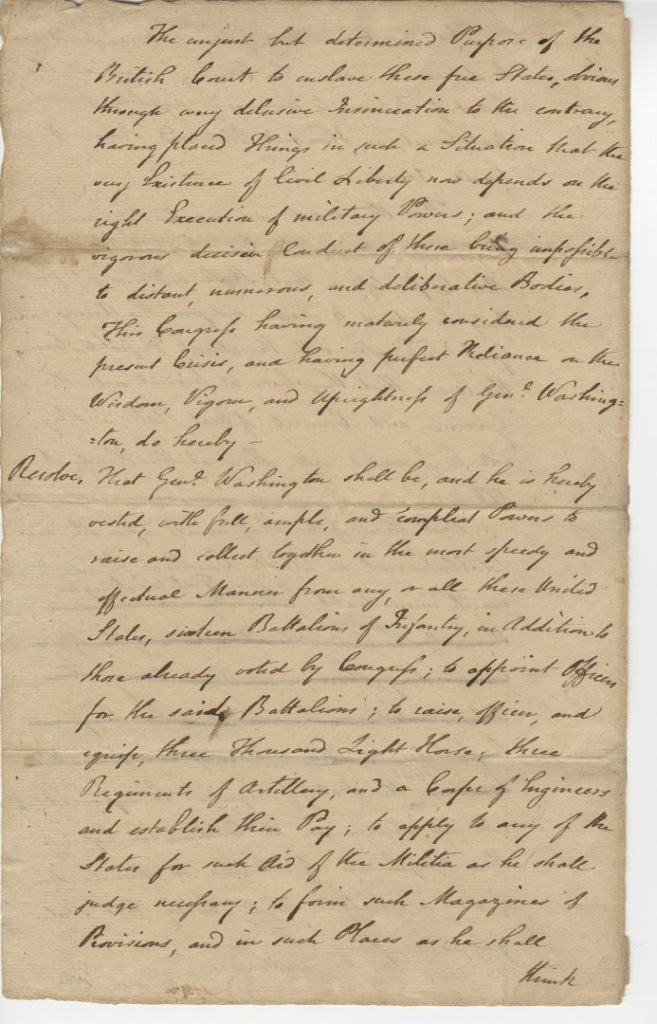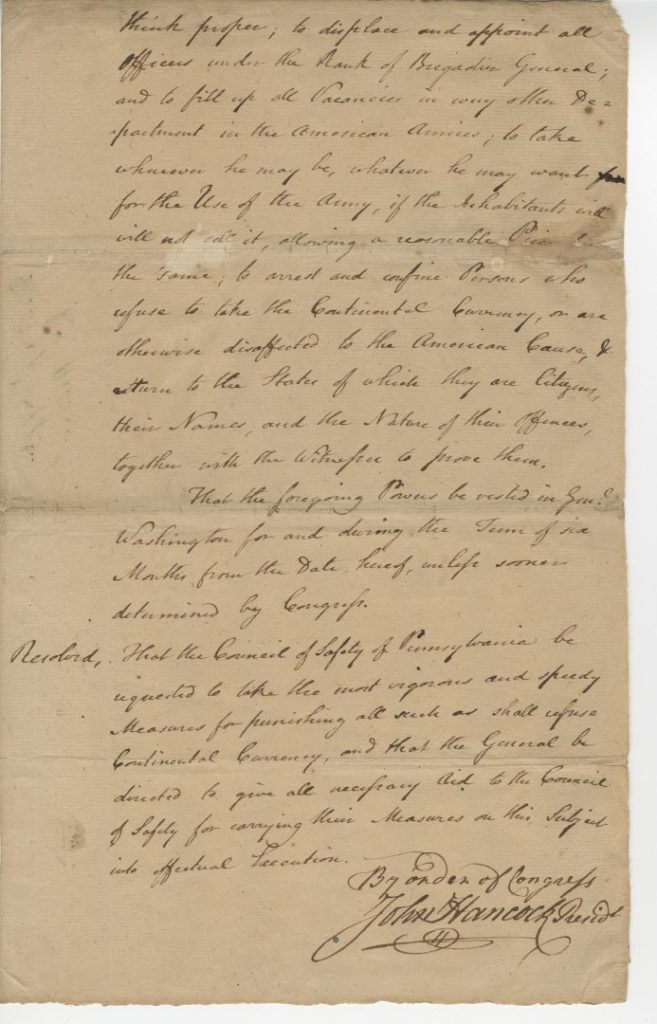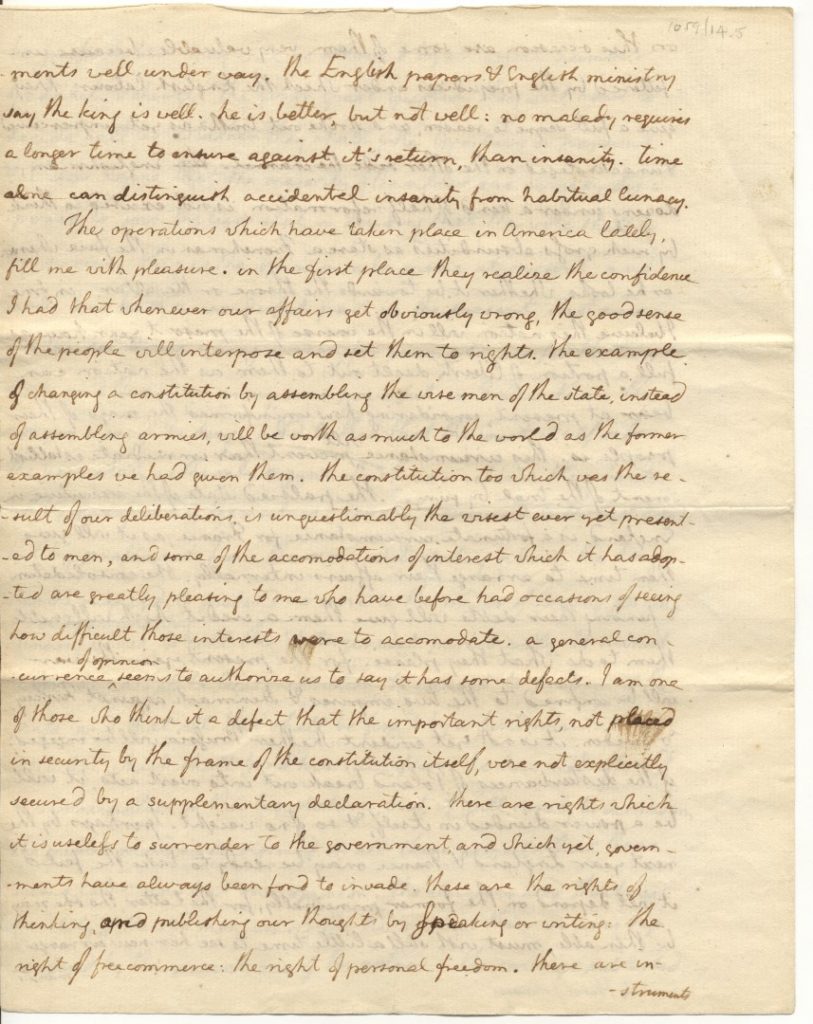As we gear up for July 4th weekend, we wanted to kick off the festivities with some fabulous founding father documents to put us in the spirit.
This document regarding Washington’s role as commander-in-chief of the Continental Army is currently on display in our Freedom Train exhibition. Dr. Rosenbach lent it to the original Freedom Train back in 1947 and it is still in our collection today. The Documents on the Freedom Train pamphlet described it this way: “This is the original Congressional order (December 27, 1776) signed by John Hancock as the President of Congress and conferring new and vast powers upon General Washington in an effort to meet the current military crisis.”


Here’s an excerpt of the order, describing the Congress’s faith in Washington and the temporary powers he was granted. (You can read the whole text at American Archives):
“The unjust but determined purpose of the British Court to enslave these free States, obvious through every delusive insinuation to the contrary, having placed things in such a situation that the very existence of civil liberty now depends on the right execution of military powers, and the vigorous decisive conduct of these being impossible to distant, numerous, and deliberative bodies, this Congress having maturely considered the present crisis, and having perfect reliance on the wisdom, vigour, and uprightness of General Washington, do hereby
Resolve, that General Washington shall be, and he is hereby, vested with full, ample, and complete power, to raise and collect together…sixteen Battalions of Infantry…to appoint Officers for the said Battalions; to raise, officer, and equip three thousand Light-Horse, three Regiments of Artillery, and a Corps of Engineers, and establish their pay; to apply to any of the States for such aid of the Militia as he shall judge necessary; to form such Magazines of Provisions, and in such places, as he shall think proper; to displace and appoint all officers under the rank of Brigadier-General, and to fill up all vacancies in every other department in the American Army; to take, wherever he may be, whatever he may want for the use of the Army, if the inhabitants will not sell it, allowing a reasonable price for the same; to arrest and confine persons who refuse to take the Continental Currency, or are otherwise disaffected to the American cause, and return to the States of which they are citizens, their names and the nature of their offences, together with the witnesses to prove them.
Another of my favorite documents, which you can see on our Founding Fathers hands-on tour, is this letter from Thomas Jefferson to David Humphreys in 1789, in which he talks about the Constitution and the Bill of Rights.

Here again is an excerpt, with full text available via the National Archives.
The operations which have taken place in America lately, fill me with
pleasure. In the first place they realize the confidence I had that
whenever our affairs get obviously wrong, the good sense of the people
will interpose and set them to rights. The example of changing a
constitution by assembling the wise men of the state, instead of
assembling armies, will be worth as much to the world as the former
examples we had given them. The constitution too which was the result of
our deliberations, is unquestionably the wisest ever yet presented to
men, and some of the accomodations of interest which it has adopted are
greatly pleasing to me who have before had occasions of seeing how
difficult those interests were to accomodate. A general concurrence of
opinion seems to authorize us to say it has some defects. I am one of
those who think it a defect that the important rights, not placed in
security by the frame of the constitution itself, were not explicitly
secured by a supplementary declaration. There are rights which it is
useless to surrender to the government, and which yet, governments have
always been fond to invade. These are the rights of thinking, and
publishing our thoughts by speaking or writing: the right of free
commerce: the right of personal freedom. There are instruments for
administering the government, so peculiarly trust-worthy, that we should
never leave the legislature at liberty to change them. The new
constitution has secured these in the executive and legislative
departments; but not in the judiciary. It should have established trials
by the people themselves, that is to say by jury. There are instruments
so dangerous to the rights of the nation, and which place them so
totally at the mercy of their governors, that those governors, whether
legislative or executive, should be restrained from keeping such
instruments on foot but in well defined cases. Such an instrument is a
standing army. We are now allowed to say such a declaration of rights,
as a supplement to the constitution where that is silent, is wanting to
secure us in these points. The general voice has legitimated this
objection. It has not however authorized me to consider as a real
defect, what I thought and still think one, the perpetual re-eligibility
of the president. But three states
out of 11. having declared against this, we must suppose we are wrong
according to the fundamental law of every society, the lex majoris
partis, to which we are bound to submit.
Happy Independence Day to all!
